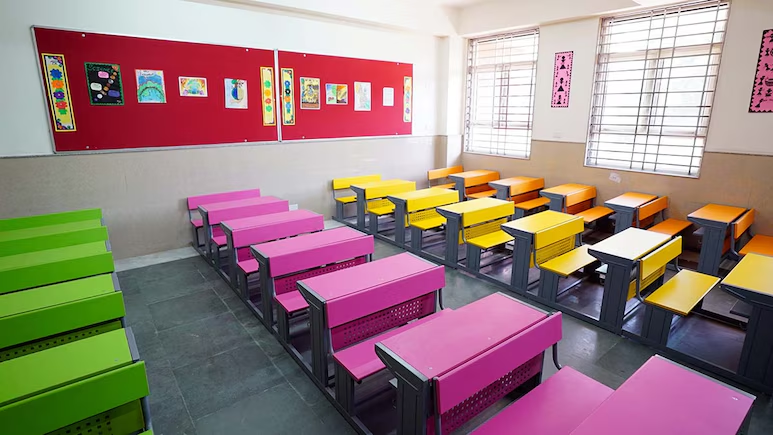
Key chapters like Democratic Rights, Food Security in India, Federalism, Citizenship and Secularism have been dropped from school courses in the national education board CBSE's bid to reduce the burden on students amid the coronavirus crisis.
The Central Board of Secondary Education (CBSE) announced on Tuesday that the syllabus for 2020-21 would be reduced by a third because of the "extraordinary situation" as the world fights the coronavirus pandemic.
The board has revised the Economics and Political Science courses for grades 9 to 12.
The chapters "completely deleted" from the Class 11 Political Science syllabus include Federalism, Citizenship, Nationalism, and Secularism.
Only two units from the 'Local Government' chapter have been deleted. These include 'Why do we need Local Governments?' and 'Growth of Local Government in India'.
From the Class 12 Political Science syllabus, the board has entirely removed "Security in the Contemporary World", "Environment and Natural Resources", "Social and New Social Movements in India", and "Regional Aspirations".
From the "Planned Development" chapter, units dealing with "changing nature of India's economic development" and "Planning Commission and Five Year Plans" have been removed.
"India's Relations with its Neighbours: Pakistan, Bangladesh, Nepal, Sri Lanka, and Myanmar" has been deleted for the present session from the chapter on India's Foreign Policy.
Chapters on Democratic Rights and Structure of the Indian Constitution have been removed from the Class 9 Political Science syllabus. A chapter on Food Security in India has been completely removed from the Economics syllabus.
For class 10 students, chapters on "Democracy and Diversity", "Caste, Religion and Gender", and "Challenges to Democracy" have been removed.
Amid outrage and protests over the changes, the CBSE said the reduction or “rationalization” of syllabus for classes 9 to 12 had been "interpreted differently" and that it was a “one-time measure” to reduce the exam stress of students due to the health emergency and to prevent learning gaps.
“The topics being mentioned as dropped are either being covered by the rationalized syllabus or in the Alternative Academic Calender of NCERT,” CBSE Secretary Anurag Tripathi said in a statement.
The board clarified that no questions would be asked from the reduced syllabus only in the board exams of 2020-21.
Bengal Chief Minister Mamata Banerjee said she was "shocked" by the decision to drop subjects like democratic rights, federalism and secularism from the Economics and Political Science syllabuses of Classes 9 to 12.
"Shocked to know that the central government has dropped topics like citizenship, federalism, secularism and partition in the name of reducing CBSE course during the COVID-19 crisis," Mamata Banerjee tweeted.
A section of academicians claimed the move appeared to give importance to "political considerations" than academics.
"On the face of it, it appears that there is some ideological element in the choice of what is deleted. How do you optimise learning during this time? You are trying to reduce the investment in education, you are compromising on the learning of students," Surajit Majumdar, a professor at the Jawaharlal Nehru University, was quoted as telling PTI.
"Reduction does not have to be because of the pandemic but for optimisation of learning," Prof Majumdar said.
Rajesh Jha, a political science professor at Delhi University, said: “Unfortunately, political considerations have taken over academics. This will only affect academic rigour and quality. The concepts of liberty, equality, social justice, secularism are linked. How can one be taught without other?"
